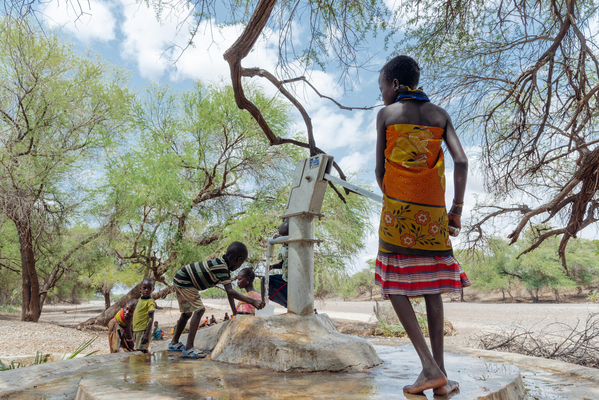If we learned anything from 2022, it’s that we can expect many more years of climate crises.
Catastrophic floods wreaked havoc across Africa from Nigeria to South Africa, killing thousands. Extreme heatwaves in Europe and Hurricane Ian in the U.S. and Cuba cost the global economy billions of dollars.
Scientists warn that extreme weather events will only get worse. A temperature increase above 1.5 degrees Celsius could be catastrophic, according to the Intergovernmental Panel on Climate Change (IPCC), the world’s leading authority on climate science.
To prevent a total climate breakdown, government leaders must rapidly and drastically reduce greenhouse gases. Although emissions across Africa represent a relatively small share of the global total – only about 2-3 per cent – our continent is paying a disproportionate price for climate change. Rather than be the victims of poor global climate policies, our leaders have the chance to be at the forefront of innovation.
One solution may be down the toilet.
Humans and domesticated animals produce nearly 4 trillion kilograms of poo each year – enough to fill approximately 1.6 million Olympic-sized swimming pools. Yet, in Africa, 779 million people lack basic sanitation services, including 208 million who still practice open defecation.
Untreated waste produces methane and nitrous oxide, accounting for 5 per cent of global emissions. While the numbers are small, their effects are powerful. Methane alone accounts for more than 20 per cent of current climate warming.
Piped sewage, while better, currently relies on fossil fuels to power energy-intensive waste treatment plans.
Alternatively, proper management of wastewater reduces and captures greenhouse gas emissions for energy production, with benefits that impact the sanitation sector and beyond.
Treated wastewater produces an organic matter known as “sludge.” Put this substance in an oxygen-free environment, like a deep landfill, and it will release methane gas. Capture it, rather than releasing it into the atmosphere, and you harness a powerful form of energy.
This includes biogas – made up of 60 per cent methane – which can potentially generate electricity for up to 138 million households. It can also turn treatment facilities into net “Zero Energy” users, which produce enough excess energy to supply their neighbors.
And then there is heat recovery, which one sanitation center in the U.K. is using to warm 2,000 homes. The company says that using poo-powered heating in place of fossil fuels could save up to 105,000 tons of carbon dioxide emissions over 30 years. This is the equivalent of more than 15,000 car journeys around the world.
Similar innovations abound across the globe. In Switzerland, a funicular railway is using human waste to power its cars. Colorado in the U.S. is using it to fuel vehicles. In Kenya, sanitation utilities make poo-based briquettes for cooking, eliminating the need for harmful charcoal which produces high carbon emissions. And Malawi is using energy from human waste to cut down on the need for firewood and simultaneously decrease harmful deforestation.
In Haiti, scientists have also tested turning human waste into compost to support agriculture. The method, they say, would reduce greenhouse gas emissions by the equivalent of 126 kilograms of carbon dioxide per year for each person using pit toilets and similar waste disposal methods. Provide this option to people in slums worldwide, and we could reduce the global sanitation sector’s methane emissions by 13-44 per cent.
As climate change continues to devastate our communities, we need this kind of innovation more than ever. Yet to make a change, we need to see the huge and untapped opportunities for climate mitigation in the water and sanitation sector. To harness them, government leaders across Africa need to wisely balance the usage of high-emission sanitation infrastructure in favor of more climate-friendly solutions.
We also need to improve energy efficiency in the water and sanitation sector, and not let valuable resources go to waste. More than 80 per cent of the world’s wastewater – and over 95 per cent in some least developed countries – is released into the environment without treatment. For example, half of wastewater treatment works in my native South Africa fail to treat sewage properly and, in many cases, fail to treat it at all. Not only is that a critical loss of resource, but it also pollutes our waterways and fuels infectious diseases.
Finally, our sanitation services have to continue to function within a changing climate. That means that we can’t just focus on climate change mitigation – reducing greenhouse gases – we must also focus on adaptation – making our systems resilient to the existing impacts of climate change, including hurricanes, floods and droughts which overwhelm sanitation systems and release untreated sewage into the environment.
Everyone needs access to safe, dignified sanitation, and the world needs sustainable waste disposal and clean energy solutions. Embarrassment over poo shouldn’t keep us from harnessing a crucial resource. We can’t afford to flush this opportunity away.
///
About the Author:
Kumi Naidoo, Member of the Global Leadership Council for the UN-hosted Sanitation and Water for All global partnership and Former Executive Director of Greenpeace
Noted South African human rights activist Kumi Naidoo is a member of the Global Leadership Council at the UN-hosted Sanitation and Water for All global partnership, the former Secretary-General of Amnesty International and former Executive Director of Greenpeace. He is also a founding chair of the Campaign for a Just Energy Future, President of the Global Call for Climate Action (GCCA), Board member of the Global Greengrants Fund and an Ambassador to the Southern African Faith Communities Environmental Institute.
///
Photo caption: On 16 June 2022, a young girl operates a hand pump in Turkana County, Kenya, which is experiencing one of the worst droughts in decades driven by climate change. © UNICEF/Kidero
